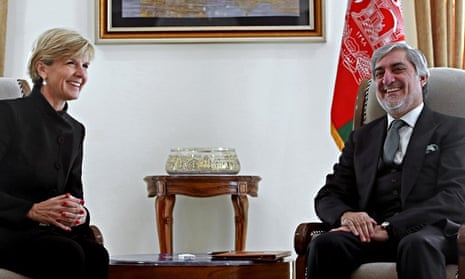Australia’s foreign minister, Julie Bishop, visited Kabul on Monday to spend Australia Day with Australian troops in the country and to reassure the new Afghan government of her country’s continued commitment.
“We believe in the Afghan people. We believe in their right to live in a stable, secure and prosperous environment,” she said in a press briefing at the Australian embassy in Kabul.
In her brief visit, Bishop met the president, Ashraf Ghani, and his chief executive, Abdullah Abdullah, and participated in a roundtable talk with women’s rights advocates and female parliamentarians.
“Over the past 10 years or more we have seen extraordinary gains in opportunities for women – in education, in health, in the number of women who are able to participate in society,” Bishop said.
The minister’s pledges of continued support come on the back of significant cuts to Australia’s aid budget, including to Afghanistan.
In 2012 the then prime minister Julia Gillard promised to increase development assistance to the country, where Australia has so far spent A$1bn on aid and lost 41 soldiers.
However, the current government under Tony Abbott has slashed aid to Afghanistan from A$148.3m last year to A$134.5m (£71m) in the 2014/15 fiscal year.
At the peak in 2011/12, Australia allocated almost A$200m to Afghanistan. A large part of the drop relates to a decision to stop funding Australian federal police support to their Afghan counterparts. Aside from contributing aid, Australia will maintain approximately 400 troops in Afghanistan.
Plummeting western aid has stirred concern among Afghans that gains achieved over the past 13 years will be jeopardised, particularly when it comes to hard-earned women’s rights. But Bishop said she had not been made aware of those worries in her meetings with Afghans, and nor did she share them.
“I am acutely conscious of the needs here, and I’ll ensure that the progress we’ve made and the gains we’ve made for the programmes to empower women will not be lost through the Australian aid programme,” she said.
Last year, Afghanistan’s ambassador to Australia said a drop in aid to his country could force more Afghans to flee to Australia by boat. Australia’s policy of processing asylum seekers offshore has caused hundreds of refugees to be detained in Nauru and Papua New Guinea, where authorities are widely accused of human rights abuses.
Recently, Afghan Hazara asylum seekers have been forcibly deported from mainland Australia. Upon returning to Afghanistan, at least one has been attacked by Taliban fighters.
Asked whether she considered Afghanistan a safe place to deport Afghan refugees to, Bishop told the Guardian: “Well, I came here. We have Australians living here. We have contractors here. We have confidence in the Afghan government’s ability and that of its security forces to make this place secure.”
The Australian government advises its citizens against all travel to Afghanistan, but Bishop rejected the implication that her government’s policies were contradictory. “We have travel advisories for most countries around the world,” she said. “They are not legislative, enforced statements, they are travel advisories.”
Bishop was the second high-ranking Australian official to visit Ghani since his election last year, after the governor-general Peter Cosgrove visited in October. Bishop last visited Afghanistan in 2009 as shadow foreign minister.
